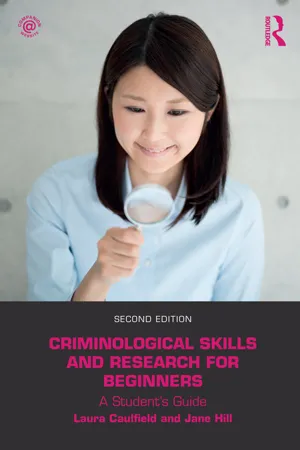
Criminological Skills and Research for Beginners
A Student's Guide
- 304 pages
- English
- ePUB (mobile friendly)
- Available on iOS & Android
About this book
Criminological Skills and Research for Beginners is a comprehensive and engaging guide to research methods in Criminology, and the skills required for academic success. Written specifically for undergraduate students and novice researchers, this book has been designed as a lively and accessible guide to planning, conducting and reporting research in the subject. It emphasises practical skills required in studying Criminology, the importance of criminological research, and places related methodology firmly in the context of students' broader study of the discipline, before moving on to provide a detailed guide to the actual processes of research.
It is common for Criminology undergraduates to feel intimidated at the prospect of conducting their own research, and these students typically struggle to see the relevance of research methods to their own studies. This book speaks directly to the needs of such students, and includes contemporary examples and case studies that bring a topic that is often thought of as dry to life, providing a thorough and accessible practical guide that students can return to at each stage of their research, all the way through to their dissertation.
This book covers:
-
- an examination of the theoretical, political and ethical debates in criminological research;
-
- a complete guide to planning criminological research, assisting student researchers in identifying their research questions, choosing their research methods and critiquing the available literature;
-
- guidance on the practicalities and processes of collecting data;
-
- a discussion of the process of analysing data and writing up research.
New to the second edition is a brand new section on research skills in Criminology, including detailed coverage of writing skills, referencing, dissertations and research reports, presentation skills and revision. The book also offers additional coverage of the politics of criminological research and the presentation of official crime statistics. Including an extensive glossary and an integrated companion website with extra examples, exercises and videos to further develop students' understanding, this book is essential reading for any undergraduate on a Criminological Research Methods or Research Skills course, or for anyone in need of practical guidance on any or all of the various stages involved in conducting thorough and effective criminological research.
Frequently asked questions
- Essential is ideal for learners and professionals who enjoy exploring a wide range of subjects. Access the Essential Library with 800,000+ trusted titles and best-sellers across business, personal growth, and the humanities. Includes unlimited reading time and Standard Read Aloud voice.
- Complete: Perfect for advanced learners and researchers needing full, unrestricted access. Unlock 1.4M+ books across hundreds of subjects, including academic and specialized titles. The Complete Plan also includes advanced features like Premium Read Aloud and Research Assistant.
Please note we cannot support devices running on iOS 13 and Android 7 or earlier. Learn more about using the app.
Information
PART I
Study skills for criminology students
Chapter 1
Writing skills and essay writing
GOALS OF THIS CHAPTER
PREPARING TO WRITE
TIP
BOX 1.1 COMMON ESSAY ‘COMMANDS’
Compare and contrast … | You are being asked to examine the similarities and differences between specific sources or theoretical positions. |
Critically evaluate … | You are being asked to judge an idea, theory or argument. In order to do this you must look at other sources and make an effort to comment on how these sources may be better or worse than the one being evaluated. You will need to weigh up the strengths and weaknesses of each (this is what is meant by being critical – it is not the same as criticising) in order to demonstrate to the reader how you have made your judgements (yes, you can make how you have made your judgements (yes, you can make judgements but you must back them up). |
Discuss … | After examining the evidence develop an argument. |
Examine … | Consider an idea, theory or argument in depth. Try to probe the assumptions behind the subject of your discussion and make comments that allow your reader to understand what you have deduced from your examination. |
Illustrate … | Many questions will include this term which should signal that you must provide examples that will enable you to explain and clarify a point. |
Review … | Suggests an in-depth assessment and critical analysis. |
What is the question asking you to do?
What does the question entail?
Critically discuss | the view that illegal drug use | is a major cause of violent crimes |
|---|---|---|
The PEE approach: make Points; provide Evidence; Explain your points by discussing the evidence. Ask yourself: ‘How convincing are my points?’ Can you rebut an opposing view? | What is the key term here? You are being asked to discuss the issue of illegal drug use but you will need to break down the concept of illegal drug use in order to define the terms of your answer (see Chapter 9). | The key terms here are major cause and violent crimes. The assumption behind the question is that there is a significant relationship between the independent variable (drug use) and the dependent variable (violent crime). |
Table of contents
- Cover
- Half Title
- Title Page
- Copyright Page
- Table of Contents
- List of figures
- List of tables
- List of boxes
- Visual tour (How to use this book)
- Part I Study skills for criminology students
- Part II The importance of criminological research
- Part III Getting going with criminological research
- Part IV Doing criminological research: data collection
- Part V Doing criminological research: analysis and writing up
- Glossary
- References
- Index